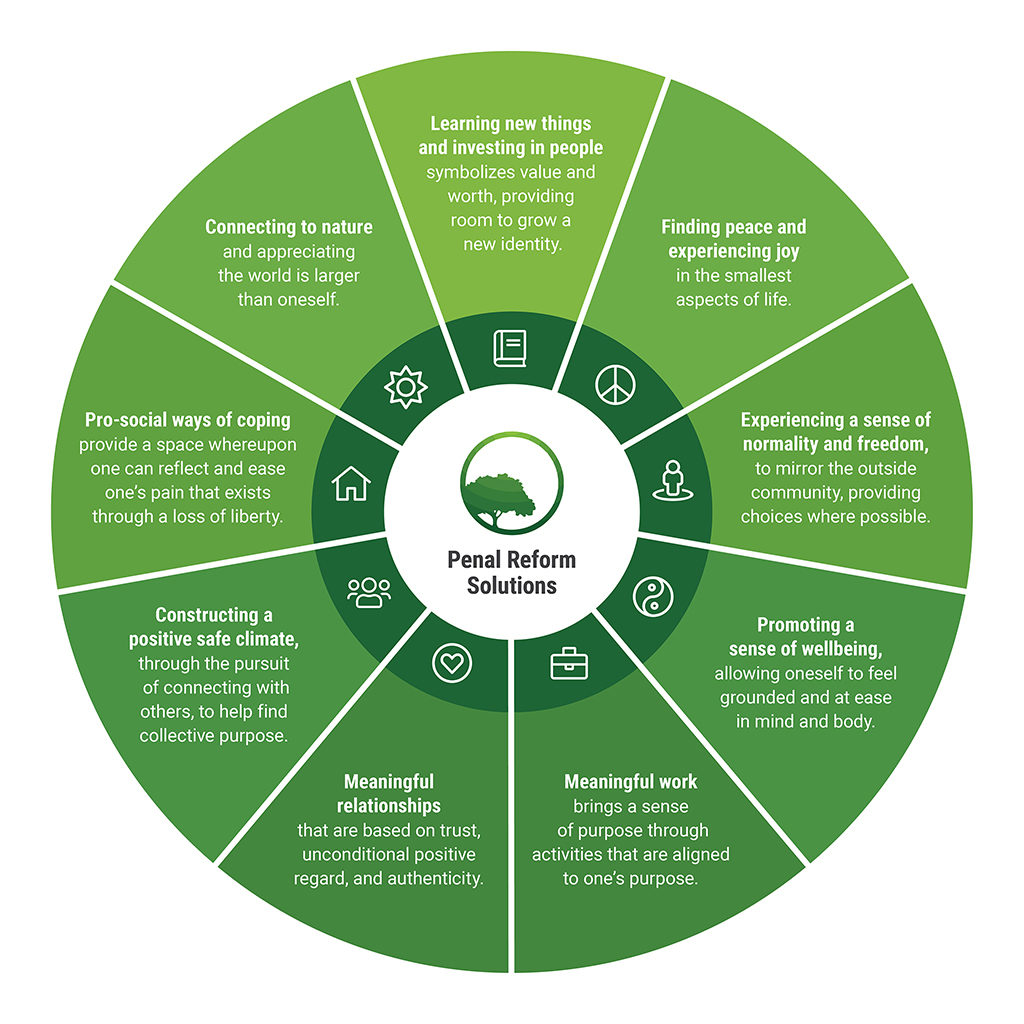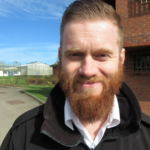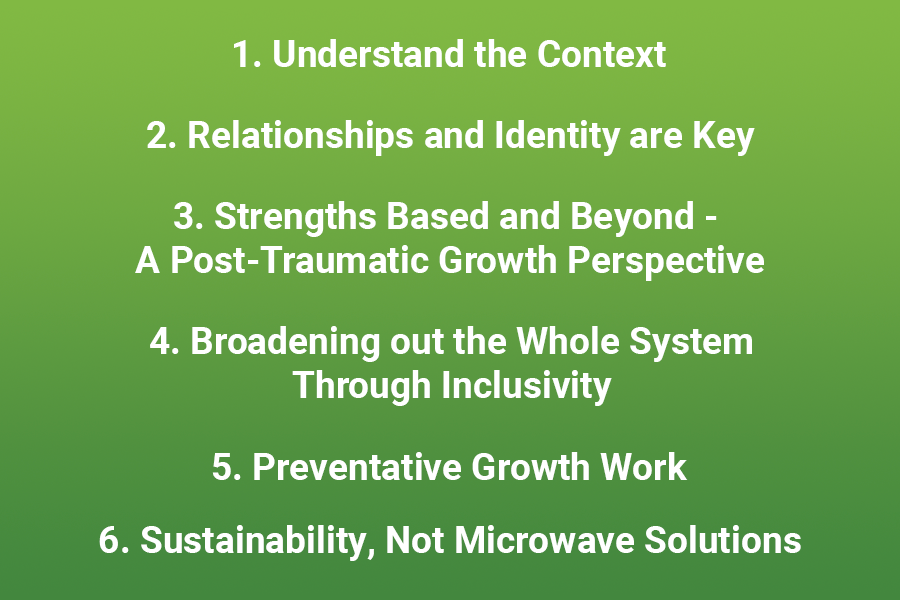
This article introduces the values and principles behind Growth and how penal reform can be realised through a Growth-based approach, emphasising the core conditions of transformative change. Gaining traction and building momentum for penal reform remains challenging; yet this article highlights how a new perspective on penal reform may help drive change and reduce social harm. This article proposes that prisons and penal organisations can be places of meaning, hope, and growth if core conditions of change are embraced to meet transformative ends.
Start with the Why
Growth is not solely about the rehabilitation of prisoners but instead focuses on growing an organisation and the culture—including staff, prisoners, families and communities—which can bring about growth into communities. Growth entails moving people forward as a collective and facilitating the process of cultural change, from a number of perspectives. It focuses on celebrating success (no matter how small), learning from mistakes with a growth mindset, and working together to create sustainable solutions in order to make prisons meaningful spaces for staff and prisoners.
Providing a strong rationale for penal reform remains central to this change process. Whilst penal reform has historically explored harm and the reduction of it, Growth focuses on how penal reform can span across communities to bring social good to everyday life. Penal Reform Solutions aims to collectively bring about change. To this end, our values focus on changing the conversation around punishment and considering ways in which marginalised groups can be brought closer together within society, in order to unite people in this change process. It focuses on inclusivity, relationships, connectivity, and humanity, as well as nurturing social responsibility and addressing the root causes of harm within a penal context. The reason for this broader perspective focuses on the notions of collective impact and shared purpose, in order to bring about lasting change.
How Growth Came About
In 2016, I started a research project in three Norwegian prisons, exploring which aspects of exceptional practice promote personal growth for both staff and prisoners. This “Prison Growth Project” focused on capturing those valued practices that supported desistance and moved people forward. A research team was established at the start of the project, consisting of both prisoners and prison staff, who captured their experiences through photo-essays and analysed the data collaboratively to meet the research aims. Through this process of authentic co-creation, the ‘Principles of Growth’ were developed.
The Principles of Growth govern everything that we do at Penal Reform Solutions. They are our guiding principles that support us in maximising the power of interventions, through the nurturing of positive relationships with ourselves, each other, nature and our future. These principles focus on:

Following the Norwegian Prison Growth Project in 2016, I started working in an English prison called HMP Guys Marsh, which was struggling with its culture and rates of violence. Utilising our findings gained from the Norwegian Prison Growth Project, we applied a similar research methodology to HMP Guys Marsh, which in 2016 was deemed “unsafe” and “culturally problematic” by the Inspectorate for Prisons. Prisoners were recruited to assist with the research, and both prisoners and prison staff were provided with cameras to capture the aspects of practice which, for them, promoted personal growth.
The photo-essays were used as a way to better understand the prison community, to educate staff in what “good” looks like, and it finally helped generate hope in the prison community as a whole. This helped staff and prisoners to recognise the pockets of growth practice that were often hidden, using these to anchor change and drive improvements. Upon reflection, the photo-essay project generated hope, as articulated during the research process (see photo essay to the right and Lewis and Robertson, 2019 for more information).

“He does his job well. He knows how to interact. He shows empathy and he doesn’t treat me like an animal. It is normal and he makes me feel normal.”
-Prisoner at HMP Guys Marsh
From the analysis of the photo-essays, the same Principles of Growth emerged, which were unearthed in the Norway Project. This built legitimacy for the Prison Growth Project as there was initial scepticism that the prison bore no resemblance to that of the more exceptional Nordic prison environments. From this moment on, we focused on addressing the key issues that were prevailing within the prison environment through a development of these Principles of Growth. In this sense, it was a more preventative, evolving approach, giving trust in the Process of Growth, which was informed by research. Over the course of the 2 ½ years at HMP Guys Marsh, the following impact was captured:
- Staff viewed their relationships with prisoners in a more positive light through comparative analysis from the Staff People’s Survey dating from 2016-2019.
- The Inspectorate in 2019 stated that relationships had significantly improved between staff and prisoners, describing the atmosphere as “calm, orderly and relaxed.” They also communicated that
the rehabilitative culture was robust and well managed and that the Growth Project had a positive impact on the motivation and progression of prisoners and staff.
Finally, the Inspectorate noted that there was a greater understanding of why people were being violent and using drugs following the collaborative, participatory research carried out with prisoners and staff from a variety of roles within the prison. This contributed to a reduction in harm, including violence and use of drugs between 2017-2019. - Both prisoners and prison staff reported an increased level of enthusiasm and hope within the closed community, encouraging new ideas to improve the prison environment. This was evidenced through an independent review in 2018, where staff stated that the Growth Project was a:
“Brilliant way to motivate everyone…it embeds positive attitudes which help raise confidence in both staff and men and has increased trust and responsibility.” Staff also stated that the Project was: “a great idea that is developing the prison” with another member of staff reflecting: “I think growth is a positive opportunity to allow change and development within our environment and to build a culture we can be proud of and hopefully maintain.”
- Staff became more reflective and gained a greater insight into the impact of their behaviour towards prisoners. This theme emerged following Reflective Practice Training and Growth Supervision, demonstrating a growth mindset towards change.
- There was “sustained support” for the Growth Project and its endeavours, evidenced by the Independent Monitoring Board, which acknowledged how the Project contributed to a safer and more decent environment stating:
“The Growth Project continued to promote mutual respect, the prisoners’ own sense of self-worth and harnessing individual’s skills in improving conditions throughout the prison” (2017-2018 Report).
- In 2019, the prison was taken out of special measures (a status given to the most failing prisons), following a significant improvement at the inspection.
- In 2019, the Butler Trust created an overview of prison practice, exploring the “good” aspects specifically, and deemed the Growth Project as: “The best thing that has happened to the Prison Service in 30 years, hands down.”
- Governor James Lucas reviewed the work following full implementation and stated:
“I believe that Dr Lewis’ work was intrinsic to our successful improvement and was an impressive balance of rigorous academic research and dedicated and enthusiastic engagement with residents.”
This Project was not without its challenges but through a growth mindset, new learning emerged as regular feedback was sought after each change, encouraging the prison to become a learning organisation.
The Core Conditions of Transformative Change
This project enabled us to consider a roadmap to transform a prison from a toxic, permissive culture towards an environment that supported the growth of the prison community as a whole. These core conditions are currently used to inform all PRS cultural work in order to drive penal reform in an integrated and collective manner. These six principles are:

1. Understand the Context
“In our debate over rehabilitative treatment versus punishment… there is often a tendency to focus solely on the act of the individual, as if crime occurs in a vacuum, wholly unrelated to other social realities.” (Alexander, 1999, p.4)
This approach to rehabilitative efforts has trickled into the way in which we work with people within a penal context. It has led to interventionism that situates change in people, rather than recognising the importance of embedding change into the social fabric of the penal landscape. In environments where trust is weak, there is a tendency to blame individuals (Topp and Chipukuma, 2016), creating scapegoats that ease the discomfort of failures within a penal environment. Instead of this position, our work focuses on understanding people within the context in which they find themselves. From a relational perspective, this focus builds trust and engages individuals within the process of change, leading to collective impact that acknowledges incremental gain and the bigger picture.
2. Relationships and Identity are Key
Relationships are central to any change process and all of the Principles of Growth require some kind of human connection in order to be activated. This includes relationships with oneself, others, and connections that are bigger than oneself (e.g., nature). These relationships determine the culture that resides in a penal setting and help shape the identity of that organisation. Whilst identity invariably considers the individual, and their isolated journey ahead, Growth examines organisational identity in real time, as it evolves. In a similar vein to the literature of desistance (see Maruna, 2004), this steady onward journey is broken by cultural obstacles, resistance to change, and the current narrative that has been embedded into the psyche of those who live and work in a penal institution. In “failing” prisons, staff may refer to the prison as failing and take on this identity, which consequently becomes self-fulfilling. By breaking this narrative through growth-based work that addresses this openly and without judgement, Growth enables people to understand the impact social context has on their work, leading to a more reflective and self-compassionate position.
3. Strengths Based and Beyond – A Post-Traumatic Growth Perspective
Adopting a strengths-based approach within rehabilitative settings has held a strong position in recent decades, highlighting the importance of seeing the individual’s strengths and skills as a way of supporting their personal journey towards desistance. Growth extends this position by considering how strength-based work can generate hope, embed new practices, and think beyond the ideas of rehabilitation. The philosophies of punishment invariably incorporate a return to “something,” whether that be a return to (re)habilitation, (re)integration or (re)formation. This not only assumes that an individual (or in this case an organisation) has been habilitated, integrated into society, or formed in a successful manner, but it also limits the trajectory of travel through the notion that there was a positive start position. Growth transcends this. It focuses on (re)imagining one’s self within an environment and doing this with utter ambition, drive, and purpose. Growth strives for perfection, yet compassionately embraces mistakes as opportunities for learning. It recognises the strength, resilience, and untapped power of those in prison and considers ways in which negative power can be transformed into social good.
The emerging work on post-traumatic growth resonates with a growth mindset (see the work of Carol Dweck). Tedeschi and Calhoun (2004) highlight that following a traumatic event, growth can occur as a result of grappling with the “new reality in the aftermath of trauma” (p.5). Post-traumatic growth acknowledges that in suffering, we can grow if we can find new learning, attach new meaning to one’s life, and develop both spiritually and personally. This mindset attached to adversity nurtures a growth mentality and creates a more resilient individual (and organisation), who is more resistant to future trauma (Tedeshi and Calhoun, 2004).
As articulated by Frazier-Camara (2013) there needs to be focus on healing a failing system, not the assumed “sickened person,” who is vulnerable and broken. Considering this within the penal landscape, prisons can be collectively painful places due to the toxicity of the environment that may have evolved. Unhealthy cultures can develop when trust erodes, leading to staff (and prisoners) feeling let down and emotionally detached. Penal practitioners can relationally disengage as they experience harmful behaviours, if there are not effective support mechanisms in place. Therefore, in order to be agents of change for those with whom they work with, these painful stories need to be acknowledged in order to maintain hope and safeguard a robust culture based on humanity, relationships, and connection.
Prisons are recognised as one of the highest rated organisations of workplace-related injury (Bureau of Labor Statistics, 2014). Working within the correctional field has physical and psychological consequences to workplace stress (Jung-Wan and Hyun-Jung, 2006), depression (Sui, Hu, Sun, Wang, Lui, Yang and Wang, 2014), post-traumatic stress (Spinaris, Denhof, & Kellaway, 2012) and substance abuse (Svenson, Jarvis, Campbell, Holden, Backs, Lagace, 1995). Research highlights the painful nature of prisons and how prison collectively is harmful, including to those who are in connection with the prison (e.g., families). Growth seeks to understand this impact and illuminate it, highlighting the far-reaching harm that has evolved, as well as creating a counter narrative that is positive, humane, and transformative in nature.
4. Broadening out the Whole System Through Inclusivity
To drive penal reform, a counter narrative of punishment requires a collective investment. More broadly, Pennington, Simpson, McConnell, Fair and Baker (2013, p.568) state we require:
“…team members with a shared commitment to finding a solution to the problem; deep knowledge in different fields of expertise; a shared ethical and value system for collaborative engagement within the research team; a position within highly connected knowledge networks; and institutional access to the required funding, material, experimental, and technological resources.”
There has been an acknowledgement that inclusionary practice holds real benefit to personal change, and this has resonated with our Prison Growth Projects. Adopting a whole systems approach is important within any change process, as it allows a community in its entirety to be the change that they seek. However, Growth strives to broaden the “system” beyond the organisation itself and explores ways in which penal institutions sit within a larger system— as part of the wider society. It aims to create greater transparency of hidden penal environments, involving local communities, families (both staff and prisoners), and the prison community itself, to provide multiple perspectives that can create meaningful change. This extends to employing former prisoners (and residing prisoners) at Penal Reform Solutions, to provide a consultancy service that is enriched by the lived experience.
There is sometimes a risk that a whole systems approach can be tokenistic and a blot on service that focuses on motivational speeches around one’s journey away from crime. Growth instead provides an integrated approach that recognises the value of every lived experience, be that prison, practitioner, or academic. As previously acknowledged (see Lewis, 2019 for a more in-depth discussion), collective impact involves an integrated infrastructure, dedicated staff, and a clear process that is regularly measured and communicated in order to reinforce the change process (Kania and Kramer, 2011).
Our “Connection Campaigns” and the Growth Alliance were created as a way to connect up these smaller systems that branch out into communities, in order to drive a collective mission that is articulated as a growth movement (see recent publication here: https://penalreformsolutions.com/publication/ ). As demonstration of the team’s commitment to connection, two of the PRS team are organising to climb Mount Everest, with two prison staff and a documentary crew, to raise awareness of people in prison, including the stereotypes, obstacles, and stigma that exists. This project contributes to the development of a counter narrative and looks to reach those communities that may have a negative view of prisoners, prison staff, and penal institutions. This connection is vital for penal reform, to create a call for meaningful action, as well as raise understanding of the complexities of correctional work.
5. Preventative Growth Work
In a similar vein, Growth work not only operates within penal institutions, but strategically focuses on life outside of prison. The “Youth Growth Project” takes place in schools and considers how nurturing the Principles of Growth from an early age can act as a buffer or protective factor that may divert children and young people away from crime. This work is facilitated by a cognitive behavioural practitioner and tutor who has experience of prison, who works with the participants to understand what factors may contribute to a life of crime. It aims to understand the needs and context of those that are on the cusp of social exclusion, to develop a sense of meaning, belonging, and connection at a critical point in their lives. Whilst this work is still in its infancy, it is argued that there needs to be greater focus on preventative work, in order to address the demand for punishment and appetite for mass incarceration, within the political arena.
6. Sustainability, Not Microwave Solutions
The final condition is linked intrinsically to the wave of punitive populism, which has emerged over recent decades and the politicisation of criminal justice matters on a global front. This has contributed to the erosion of resource, trust, hope, and legitimacy that leaves penal institutions in a chaotic, reactive place, where short term assurances dominate. This leaves us in a constant state of uncertainty, inconsistency, and a poorly articulated long-term vision. We are used to microwave solutions, due to the urgency to meet ego-centric reputational needs, which are self-serving, as opposed to community-serving. Plowman, Solansky, Beck, Baker, Kulkarni and Travis (2007) highlight that leaders should focus more on evolving teams and practice, rather than controlling them. Therefore, to fully embed a transformative culture, penal institutions need time to heal, rebuild and grow at a pace that is realistic and sensitive to the needs of the people that work and live within them.
Conclusion
In conclusion, people matter, growth matters, and our relationships are the mechanism that enable long-term transformation within penal reform. By working together, a consideration and appreciation of the context is necessary to build trust and understanding, so that penal organisations can collectively heal through this particularly challenging time, looking for sustainable solutions through a whole systems approach. These foundations are necessary for penal reform to take root and grow, working together to address the common goal of humanitarian practice and collective growth.
*Specific references available upon request.

About the Author
Dr. Sarah Lewis is the Director of Penal Reform Solutions, a unique organisation that provides consultancy, training and programmes in Growth, with consultants who have experience as practitioners, academics, and people with lived experience.
Dr. Sarah Lewis is the founder of the Growth Alliance, a Senior Consultant for the Council of Europe, and author of Therapeutic Correctional Relationships, a research informed practitioner’s guide to developing relationships and mending relational ruptures within correctional practice.

